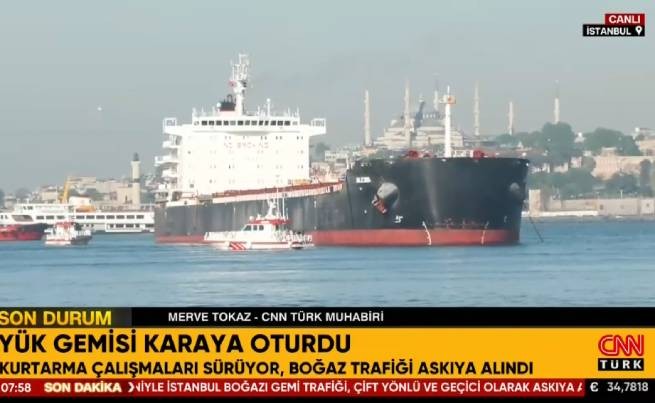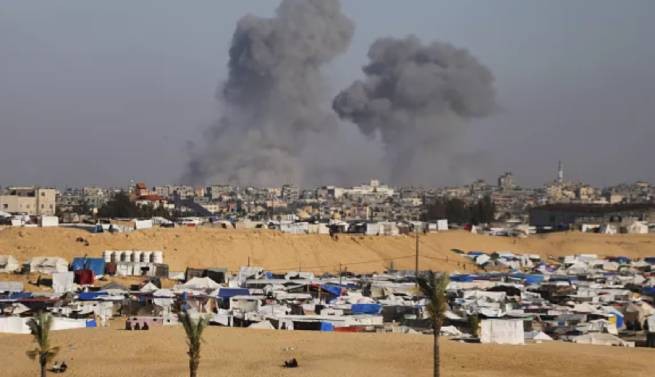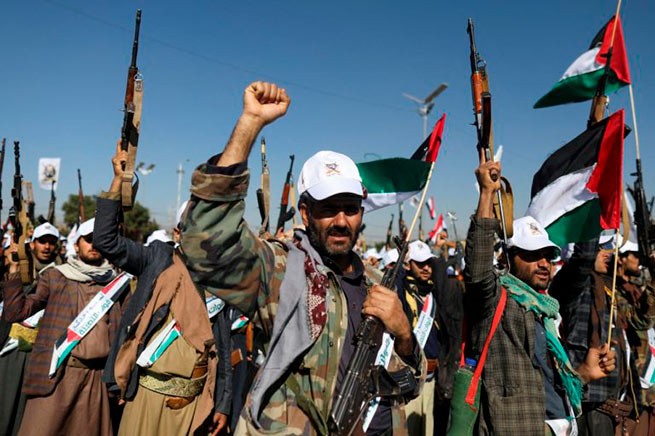Since mid-November, Yemen’s Iran-backed Houthi rebel group has carried out dozens of attacks on ships passing through the Red Sea and the Suez Canal, a crucial shipping route through which 12% of global trade passes.
The US and some of its allies, including Britain, launched retaliatory strikes against the group’s positions inside Yemen early on Friday (12/1), putting the group and its decades-long armed struggle under the spotlight.
The attack by the US and its allies came a day after the UN Security Council voted to “in the most decisive manner” Condemn at least twenty-four attacks carried out by the Houthis on merchant ships, which it said had disrupted global trade and undermined freedom of navigation.
Who are the Houthis
The Ansurala movement is a movement inspired by Zaydism, which is a form of Shia Islam, and has been involved in the Yemeni civil war for many years. Established name “Houthi rebels” comes from the name Hussein al-Houthi, who was the founder of the movement. Today the leader of the movement is his brother Abdul Malik al-Houthi.
After 2011, the Houthis intensified their activities and were gradually able to control most of the country, including the capital Sanaa. The response to their advance was Saudi Arabia, which led a coalition of Gulf powers in support of the internationally recognized Yemeni government. Saudi Arabia’s intervention resulted in a particularly bloody conflict, with numerous casualties and an unprecedented humanitarian disaster.
However, despite the superiority of their opponents, the Houthis managed to survive and consolidate their power. This was the result of guerrilla warfare, which was also based on the gradual acquisition of experience in the use of drones and missiles, which showed that they could even hit strategic targets in Saudi Arabia.
As a result of developments on the battlefield, the situation in Yemen has stabilized and peace negotiations with Saudi Arabia have begun, which give hope for a lasting ceasefire and real recognition of Houthi power in the areas they control. In all these efforts they are supported by Iran, which is part of the so-called “axis of resistance” along with Hezbollah and Hamas.
Ideologically, the Houthis are characterized by strong opposition to the United States and Israel
Their leaders often draw parallels between the American-made bombs used to attack their forces in Yemen and the weapons supplied to Israel and used in Gaza, the New York Times article noted. The Houthis consider themselves part of the “axis of resistance.”

Houthi rebels attack the Galaxy Leader ship in the Red Sea
Once a loosely organized rebel group, the Houthis have bolstered their arsenal in recent years to include cruise missiles, ballistic missiles and long-range drones. Analysts attribute the expansion to support from Iran, which supplies militias across the Middle East to expand its influence, although the Houthis themselves appear to have contributed heavily to the development of these weapons systems.
Currently, the Houthis in the part of the country they control behave like the government of an organized state and have acquired the features of a full-fledged armed force.
Red Sea attacks
When Hamas invaded Israel on October 7 and war broke out between them, the Houthis declared their support for Hamas and, furthermore, that they would attack any ship heading to or from Israel. Yahya Sarea, a Houthi spokesman, has often said the group is attacking ships to protest the “killing, destruction and siege” in Gaza, and in solidarity with the Palestinian people. In fact, the mood in Yemen is strongly pro-Palestinian, and Sanaa hosts some of the largest pro-Palestinian demonstrations in the world. In this context, they have been one of the biggest headaches for Israel from the very beginning, given the geographical distance.
They said they would attack any ship heading to or from Israel.
The Houthis’ geographic position allows them to disrupt shipping in the Red Sea and, accordingly, in the Suez Canal, as well as significantly impede Israel’s passage through the Red Sea. Since November, the Houthis have carried out 27 drone and missile strikes on ships in the Red Sea and Gulf of Aden that they say are heading to or leaving Israeli ports. The latest attack took place at 2 a.m. Thursday when a missile landed near a merchant ship, the U.S. military said.
Perhaps the most daring Houthi operation took place on November 19, when militants seized a ship called the Galaxy Leader and took it to a Yemeni port, taking 25 crew members, mostly Filipinos, captive.

Leader of the Ansurala movement (Houthi rebels) Abdul Malik al-Houthi
How do these attacks affect the rest of the world?
Speaking to reporters in Bahrain on Wednesday, US Secretary of State Antony Blinken warned that ongoing Houthi attacks in the Red Sea could disrupt supply chains and in turn raise the cost of everyday goods. Houthi attacks affected ships associated with more than 40 countries, the US Secretary of State noted.

Antony Blinken said ongoing Houthi attacks on merchant ships passing through the Red Sea could lead to higher costs of everyday goods.
Shipping companies MSC and Maersk said they were avoiding the region and that their capacity was now limited
Re-routing ships around Africa adds an additional 4,000 miles and 10 days of travel time, and requires more fuel. However, continued use of the Red Sea as a gateway will also lead to higher insurance premiums. Thus, any option will hit the already fragile global economy.
US actions
The Biden administration has repeatedly condemned Houthi attacks in the Red Sea and created a naval task force to try to bring them under control.
The task force, called Operation Prosperity Guardian, brings together the United States, Britain and other allies and is patrolling the Red Sea to preserve, in the words of Antony Blinken, “freedom of navigation” and “freedom of transportation.”
Bahrain is the only Middle Eastern country that has agreed to take part in the operation. While many countries in the region depend on trade passing through the Red Sea, they do not want to be tied to the United States, Israel’s closest ally, analysts say.
American and British warships intercept some Houthi missiles and drones before they reach their targets. On Wednesday, U.S. fighter jets from the aircraft carrier USS Dwight D. Eisenhower, along with four other warships, intercepted 18 drones, two anti-ship cruise missiles and one ballistic missile, Central Command said in a statement. On December 31, US Navy helicopters sank three Houthi ships that attacked a commercial cargo ship.







More Stories
Traffic in the Bosphorus Strait is suspended due to the ALEXIS vessel running aground
"Eurovision" starts on May 7, the competition participants paraded along the turquoise path (video)
Xi Jinping arrived on an official visit to Paris (video)